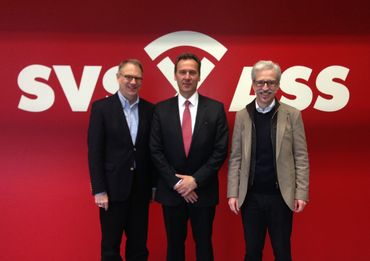In April 2015, representatives of GSI (D), the Central Welding Technology Institute in Vienna - SZA (A) and the Swiss Welding Society - SVS (CH) congregated on the occasion of the now already traditional meeting of DACH.
Apart from the reciprocal information about the latest developments in the participating societies, the discussions were strongly characterised by the subject of the utilisation of teaching and learning documents for welding technology and testing technology. There were intensive consultations about the German-language documents provided by GSI, as are used in Switzerland and Austria too.
Both SZA and SVS utilise these teaching and learning documents for the training of welding engineers (SFI) and welding specialists (SFM). In addition, these documents are used during the training of welding inspectors and during the training in the non-destructive testing (NDT) of welded structures. All three societies attach particular significance to the refinement and application of distance courses (E-Learning). Apart from this assessment of teaching and learning documents, an exchange of experience in relation to the qualification testing and certification of personnel was on the agenda.
All three societies consider themselves to be driving forces behind modern training not only in their countries but also in their common appearance on the European and international levels. In this respect, all three societies regard the further modularisation and the increasing individualisation particularly in the practical training as challenges which they are also taking up, amongst other measures, by utilising welding simulation systems (Virtual Welding Training Systems - VWTS).
There is a consensus that these systems will alter the practical training in welding technology even further. Therefore, the three societies have agreed upon a continuous exchange of experience with regard to the application of these systems, also in order to incorporate their experience into the work on European and international sets of rules. In this respect, interfaces are increasingly being seen on the subject of the automation of welding processes too.
For this purpose, the representatives of the societies have agreed upon a further exchange of experience on the occasion of the DVS Congress and the DVS Expo in September of this year. At these DVS events, particular significance will be attached not only to the subject of VWTS but also to the subject of automation.
Contact: Klaus Middeldorf




